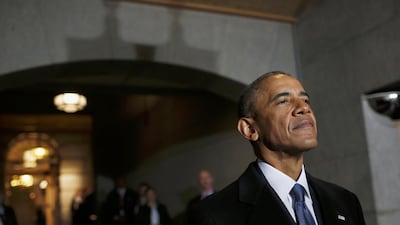For supporters and fans of America's outgoing president, the past few weeks have been something of a victory lap for Barack Obama, a reminder of the very best of the man who governed the United States for eight years.
Liberal and cosmopolitan, a man who read books and knew how to dance, unafraid to laugh or cry in public, dedicated to his family, this was the Obama that most of his supporters wanted to remember.
Yet it when it comes to assessing Mr Obama’s legacy, all of the optics and the public relations will fade, leaving only the policy and the politics. And on that score, Mr Obama’s legacy is more complex, especially abroad.
At home, liberals must reckon with what, from their perspective, is the single worst achievement of Mr Obama: Donald Trump. Eight years of the Obama presidency have led to at least four years of Mr Trump, because the latter's rise could not have come about without a consistent marginalisation of large parts of America's electorate – a marginalisation over many years that culminated in the “whitelash”, as it has been called, of angry, white, working class voters who were left behind.
Despite my misgivings about what kind of president Mr Trump will make, I retain enormous sympathy for these men and women who have seen their life chances decimated and those of their children extinguished. For a man who talked often and eloquently about a unified America, Mr Obama appears to have ignored them for too long.
To some degree, that failure set the pattern for his foreign policy. While Mr Obama expressed a belief in international cooperation and shared values, he failed to follow through on the hard political work. When the politics in places far away, whether far away from Washington or from the US itself, became too tricky, he retreated, choosing to do the things that were easy and only rarely those things that were hard.
In the Middle East, a president thought of as deliberative and strategic will be remembered mainly for improvised policy.
Look, for instance, at the long-running occupation of Palestinian territory. Mr Obama may have delivered a final flourish at the United Nations, but he had eight long years to stand up to Congress, to push back against the pro-Israeli lobbyists, to forge a path independent of Israel and forge alliances with others who shared his vision. And he did not.
In Libya, he intervened just enough to topple Muammar Qaddafi, leaving the aftermath to others. In Yemen and Pakistan, he fought his wars with drones, sidestepping the need to actually ask Congress for approval.
The one time Mr Obama sought to enact a long-term plan, over the Iran nuclear deal, he did so against the wishes of his allies in the region. That deal was hard diplomacy, but its effects were to alienate America's allies in the Gulf and embolden Iranian interference in the Middle East.
But it is Syria, above everything else, that will stand as Mr Obama’s worldwide legacy. As the four-letter-word Iraq is stamped on the presidency of George W Bush, so the five-letter-word will follow Mr Obama into the future.
The failure to enforce red lines over Bashar Al Assad's use of chemical weapons was a pivotal moment in the Obama presidency. Its effects were felt far beyond the Middle East, emboldening China and Russia.
Moreover, it will have long-lasting effects. Barely noticed over the weekend, Russia signed a 50-year agreement with Syria to create a permanent air base in Latakia and expand the existing naval facility in Tartus. Mr Obama opened the door and Russia will now be in the Middle East for years to come.
Mr Obama faced a tough set of circumstances in the Middle East, far tougher than any US president for years. The Arab Spring began and, if not ended, at least faded, under his presidency. Yet he was too often mercurial in his foreign policy, unwilling to commit to a long-term strategy.
For all the chaos unleashed by Mr Bush’s invasion of Iraq, he did spend months assembling a coalition against Saddam Hussein. Mr Obama did nothing comparable against Bashar Al Assad, preferring to use the ad shoc funding of various rebel groups. He did not have, in Hillary Clinton’s devastating critique of his presidency, an “organising principle” beyond “don’t do stupid stuff”.
That makes an understanding of the “Obama doctrine’ complicated. Without knowing where Mr Obama wanted to go, it is difficult to assess whether he actually got there.
Instead, context will matter, and no discussion of his legacy will be complete without an understanding of the eight years of George W Bush before him and the years of Donald Trump that follow. Only then will an accurate assessment be formed of what Mr Obama did and left undone and what he bequeathed to his successor.
But today, as America starts its first week with a new president, it is worth asking why many in the Middle East are quietly welcoming Donald Trump.
The answer is that they look at the eight years of an Obama presidency the same way many millions of forgotten Americans did, and asked themselves, fairly or unfairly: did things get better with Barack Obama in charge?
falyafai@thenational.ae
On Twitter: @FaisalAlYafai


